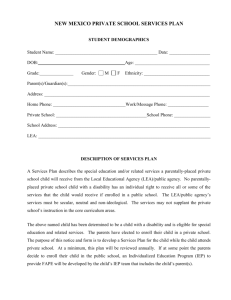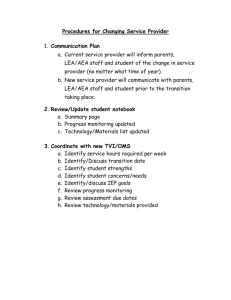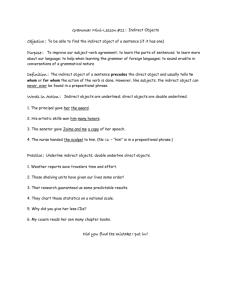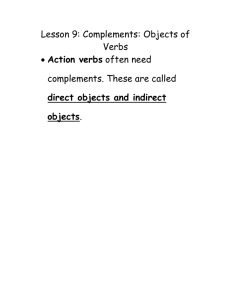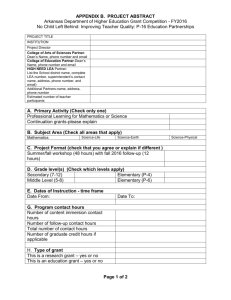Grant Submission Deadline
advertisement
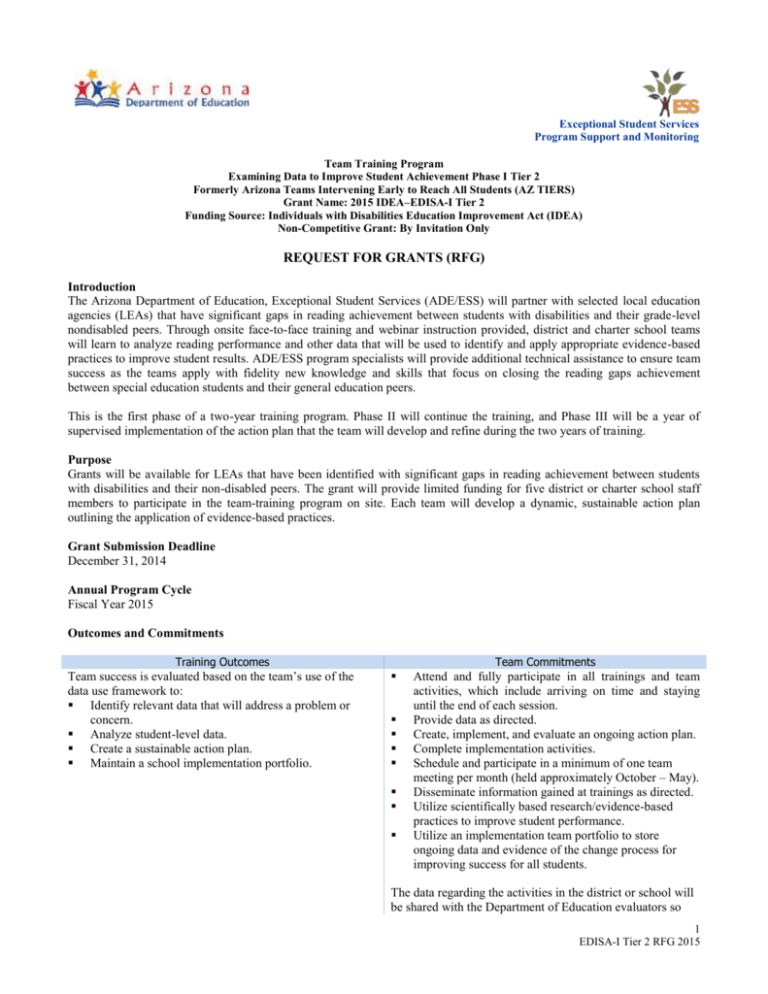
Exceptional Student Services Program Support and Monitoring Team Training Program Examining Data to Improve Student Achievement Phase I Tier 2 Formerly Arizona Teams Intervening Early to Reach All Students (AZ TIERS) Grant Name: 2015 IDEA–EDISA-I Tier 2 Funding Source: Individuals with Disabilities Education Improvement Act (IDEA) Non-Competitive Grant: By Invitation Only REQUEST FOR GRANTS (RFG) Introduction The Arizona Department of Education, Exceptional Student Services (ADE/ESS) will partner with selected local education agencies (LEAs) that have significant gaps in reading achievement between students with disabilities and their grade-level nondisabled peers. Through onsite face-to-face training and webinar instruction provided, district and charter school teams will learn to analyze reading performance and other data that will be used to identify and apply appropriate evidence-based practices to improve student results. ADE/ESS program specialists will provide additional technical assistance to ensure team success as the teams apply with fidelity new knowledge and skills that focus on closing the reading gaps achievement between special education students and their general education peers. This is the first phase of a two-year training program. Phase II will continue the training, and Phase III will be a year of supervised implementation of the action plan that the team will develop and refine during the two years of training. Purpose Grants will be available for LEAs that have been identified with significant gaps in reading achievement between students with disabilities and their non-disabled peers. The grant will provide limited funding for five district or charter school staff members to participate in the team-training program on site. Each team will develop a dynamic, sustainable action plan outlining the application of evidence-based practices. Grant Submission Deadline December 31, 2014 Annual Program Cycle Fiscal Year 2015 Outcomes and Commitments Training Outcomes Team success is evaluated based on the team’s use of the data use framework to: Identify relevant data that will address a problem or concern. Analyze student-level data. Create a sustainable action plan. Maintain a school implementation portfolio. Team Commitments Attend and fully participate in all trainings and team activities, which include arriving on time and staying until the end of each session. Provide data as directed. Create, implement, and evaluate an ongoing action plan. Complete implementation activities. Schedule and participate in a minimum of one team meeting per month (held approximately October – May). Disseminate information gained at trainings as directed. Utilize scientifically based research/evidence-based practices to improve student performance. Utilize an implementation team portfolio to store ongoing data and evidence of the change process for improving success for all students. The data regarding the activities in the district or school will be shared with the Department of Education evaluators so 1 EDISA-I Tier 2 RFG 2015 that success can be assessed. Individual student information will not be released. Team Membership Requirements Each team must include, at a minimum, the following: Special education director or assistant special education administrator Curriculum and instruction director District data specialist Special education teacher General education teacher If the LEA is unable to meet the team requirements, please contact Teresa Kirkman, TIERS/DART/EDISA Facilitator, at 602-542-3005 or Teresa.Kirkman@azed.gov to confirm participation by another. The LEA may add other team members who will contribute to the process. The additional team members are considered bona fide members, and all commitments that apply to the five required members shall also apply to the added members. The grant will support the added team member needs (e.g., applicable substitutes and mileage). 2014–2015 Training Schedule The training dates for each participating LEA have already been scheduled with the ESS assigned program specialist. Funding The grant will provide funding for eligible teams to participate in the training as long as: Federal IDEA funds are available to support this program; and The LEA and the participating team maintain their commitments (which are outlined in this document) and abide by the LEA Assurances. The Excess Cost Requirement The excess cost requirement means that the agency must spend a certain minimum amount for the education of its children with disabilities before Part B funds are used. Children served with Part B funds must have at least the same average amount spent on them from sources other than Part B as do children in the LEA as a whole. Each applicant must assure the state education agency (SEA) that the LEA uses funds provided under Part B of the Act to supplement and, to the extent practicable, increase the level of state and local funds expended for the education of children with disabilities, and in no case to supplant those state and local funds. Maintenance of Effort (MOE) To meet the MOE requirement, the total amount or average per capita amount of state and local school funds budgeted by the LEA for expenditures in the current fiscal year for the education of children with disabilities must be at least equal to the total amount or average per capita amount of state and local school funds actually expended for the education of children with disabilities in the most recent preceding fiscal year for which the information is available. Allowances may be made for: Decreases in enrollment of children with disabilities; The termination of costly expenditures for long-term purchases such as the acquisition of equipment and the construction of school facilities; The replacement of personnel with qualified, lower-salaried personnel; The termination of the obligation to provide a program of special education to a particular child with a disability that is in an exceptionally costly program; or The assumption of cost by the high-cost fund operated by the SEA. However, please note that budgeting a certain amount and expending that amount by the end of the year are two different issues. If none of the allowances apply, the applicant agency must make sure that the special education expenditures meet or exceed the previous year’s special education expenditures, excluding Fund 011, impact aid for students with disabilities. You must submit for Program 200 disability categories only (exclude gifted, bilingual, remedial, vocational, career education and fund 011 amounts). 2 EDISA-I Tier 2 RFG 2015 Funding Restrictions This grant does not allow the following expenses. Carryover Carryover of funds from year to year is not allowed. Capital Outlay The purchase of capital outlay or other equipment or furniture is not allowed. Funding Allowances Consider the following information when planning and developing the budget. The list of items may be purchased with this grant’s funds. The 2012 Chart of Accounts and Expense Classifications, Uniform System of Financial Records, has been revised effective July 1, 2007. The line item placement of allowed funding for IDEA capacity building grants, including this grant, follows: 2100, 2200, 2600, 2700 – Support Services (Students, Instr., Operation, Transport) All funding that supports the training of teachers and instructional aides who work with students in the classroom must be placed in this function code. This includes the purchase of substitute services, registration fees, and a portion of applicable travel costs. 2300, 2400, 2500, 2900 – Support Services (General, School, Central Services, Other) All funding that supports the training of district or school administrative staff and other non-instructional related service providers must be placed in this function code. This includes registration fees, and a portion of applicable travel costs. 1. 6100–Salaries and 6200–Employee Benefits Substitutes Substitute teacher costs and employer-related benefits at the district or charter school rates. The substitute teacher is considered an employee of the LEA with employer-related costs, even if the salary and benefits are paid for by different funding sources. The grant will pay for substitute and employer-related costs for attendance at the scheduled team-training days scheduled on school days. 2. 6300–Purchased Professional Services Substitutes Substitute teacher costs at the contracted rate or flat rate. There are no employer-related costs for these substitutes. The substitute teacher is a contracted service provider or is paid a flat rate for the provision of substitute teacher services, receives an annual 1099, and is responsible for paying his or her taxes. The grant will pay for substitute costs at the contracted amount for attendance at the scheduled team-training days scheduled on school days. 3. 6500–Other Purchased Services Funding to cover mileage, is allowed for a team member who must travel a minimum of 51 miles from the school to the training site. 4. Mileage Allowance Use MapQuest to estimate the miles from the district or school office to the training site. Round-trip miles are calculated at $0.445 per mile in the budget. Round up to the nearest dollar. 6910–Indirect Cost Recovery Indirect costs at the applicant’s approved restricted indirect cost rate and county-approved restricted indirect cost rate, if they are applicable, are allowed with this grant funding. If approved rates are available at the time of the grant submission, the grant will automatically calculate the indirect cost amount; but the applicant must manually type it in the appropriate cell within the budget. If indirect cost rates are not available, the grant will not allow you to enter indirect cost estimates. A web-approved grant may be amended later to include indirect costs at the approved rate(s). No other administrative costs are allowed. Budget Development 3 EDISA-I Tier 2 RFG 2015 The ESS Funding unit has developed a preferred format for you to use to list and describe the items that are allowed purchases with this funding source. Budget examples in this format are shown below. Develop your budget in the addendum following format of the examples shown below. A grant’s budget that does not adhere to this format will be rejected for revisions. Budget Examples These budget examples are presented in the preferred format and demonstrate a case scenario in which the greatest allowances are given for a team that requires additional substitutes and travel funding and stipends for attending trainings on unscheduled school days. (Do not include these additional items in your budget unless you are sure that your team is eligible to receive them.) The format of the examples, however, is consistent with that of a team that does not require additional funding, which is normal for most teams. Adjust these budget examples to fit your team’s needs. 6100–Salaries Funding for substitutes that are paid a contracted or flat rate must be placed in 6300–Purchased Professional Services. Object Code Function Code Project Time (FTE) 6100–Salaries 2100, 2200, 2600, 2700 – Support Services (Students, Instr., Operation, Transport) Quantity 1 Salary, Rental, or Unit Cost $400.00 Line Item Total $400.00 Salary, Rental, or Unit Cost $80.00 Line Item Total $80.00 Salary, Rental, or Unit Cost $400.00 Line Item Total $400.00 Narrative Description 2 teacher substitutes x $100 x 2 training days = $400 6200–Employee Benefits Object Code Function Code Project Time (FTE) 6200–Employee Benefits 2100, 2200, 2600, 2700 – Support Services (Students, Instr., Operation, Transport) Quantity 1 Narrative Description 20% local substitute benefits rate = $80 6300–Purchased Professional Services Object Code Function Code Project Time (FTE) 6300–Purchased Professional Services 2100, 2200, 2600, 2700 – Support Services (Students, Instr., Operation, Transport) Quantity 1 Narrative Description 2 contracted teacher substitutes x $100 x 2 training days = $400 6500–Other Purchased Services Funding for mileage at the state rate for a team member who must travel a minimum of 51 miles from his or her school or office site to the training site may be included in this grant. “R/T” means round trip. Round up to the nearest whole mile and dollar amounts. Object Code Function Code Project Time (FTE) 6500–Other Purchased Services 2100, 2200, 2600, 2700 – Support Services (Students, Instr., Operation, Transport) Quantity 1 Salary, Rental, or Unit Cost $91.00 Line Item Total $91.00 Salary, Rental, or Unit Cost $91.00 Line Item Total $91.00 Narrative Description Teacher mileage 102 R/T training miles x $0.445 x 2 training events = $91 Object Code Function Code Project Time (FTE) 6500–Other Purchased Services 2300, 2400, 2500, 2900 – Support Services (General, School, Central Services, Other) Quantity 1 Narrative Description Non-instructional staff mileage 102 R/T training miles x $0.445 x 2 training events = $91 6910–Indirect Cost Recovery 4 EDISA-I Tier 2 RFG 2015 If your district or school has a current approved, restricted indirect cost rate, the new GME will automatically calculate that amount, but you must type the amount in the Salary, Rental, or Unit Cost and Line Item Total columns Object Code Function Code 6910–Indirect Cost Recovery 0000–Other Project Time (FTE) Quantity Salary, Rental, or Unit Cost Line Item Total 1 Narrative Description Approved restricted indirect cost Contacts for Assistance Program Support and Monitoring and Training and Training Outcomes Teresa Kirkman, TIERS/DART/EDISA Facilitator, 602-542-3005, Teresa.Kirkman@azed.gov Grant Issues Celia Kujawski, IDEA Capacity Building Grant Coordinator, 602-432-3213, Celia.Kujawski@azed.gov Grants Management Enterprise Technical Difficulties 844-893-9789 or local 602-542-3901, GrantsManagementGroup@azed.gov 5 EDISA-I Tier 2 RFG 2015
